 Petzlover
Petzlover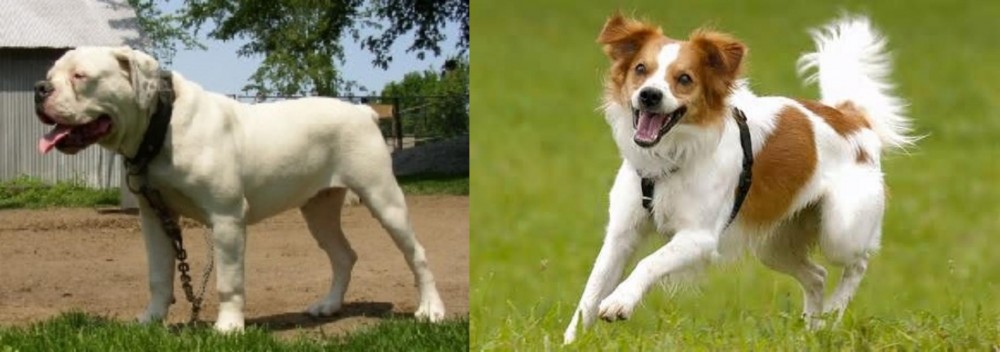 Hermes Bulldogge is originated from United States but Kromfohrlander is originated from Germany. Hermes Bulldogge may grow 17 cm / 7 inches higher than Kromfohrlander. Hermes Bulldogge may weigh 52 kg / 115 pounds more than Kromfohrlander. Both Hermes Bulldogge and Kromfohrlander has almost same life span. Both Hermes Bulldogge and Kromfohrlander has almost same litter size. Both Hermes Bulldogge and Kromfohrlander requires Low Maintenance.
Hermes Bulldogge is originated from United States but Kromfohrlander is originated from Germany. Hermes Bulldogge may grow 17 cm / 7 inches higher than Kromfohrlander. Hermes Bulldogge may weigh 52 kg / 115 pounds more than Kromfohrlander. Both Hermes Bulldogge and Kromfohrlander has almost same life span. Both Hermes Bulldogge and Kromfohrlander has almost same litter size. Both Hermes Bulldogge and Kromfohrlander requires Low Maintenance.
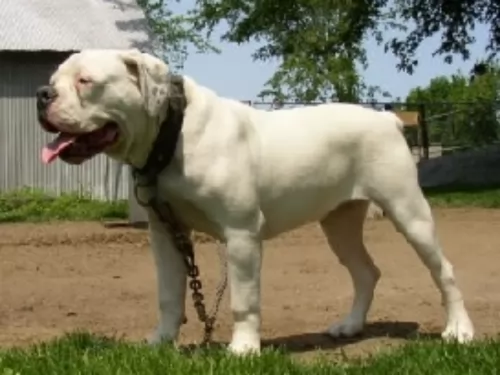 The Hermes Bulldogge is not a breed in itself, but is actually a line within the English Bulldogge line. The Hermes family in the United States bred this line for several years. The Hermes Bulldogge line is the largest of the re-creations from the English Bulldogge. They are inspired by the arena dogs from the days of the Roman Empire. Greg and Linda Hermes have bred healthy, smart, resilient and agile dogs. The desire of the Hermes was an attempt at recreating the 17th century dog.
The Hermes Bulldogge is not a breed in itself, but is actually a line within the English Bulldogge line. The Hermes family in the United States bred this line for several years. The Hermes Bulldogge line is the largest of the re-creations from the English Bulldogge. They are inspired by the arena dogs from the days of the Roman Empire. Greg and Linda Hermes have bred healthy, smart, resilient and agile dogs. The desire of the Hermes was an attempt at recreating the 17th century dog.
They used a variety of breeds to create the Hermes Bulldogge, most of whom are never disclosed. Some of the dogs that were probably used include: English Mastiffs, American Bulldogs, Old English Bulldogges, and pit Bull Terriers. This family of dogs are playful, friendly, and good family dogs. They have a strong prey drive which makes them good hunters but not as good around other small animals or small children. The Hermes have been breeding the Hermes Bulldogge since since 1983. The puppies are all hand raised, child friendly with great health.
When discussing the Hermes Bulldogge, one must go back to the root of the English Bulldogge. That breed comes originally from England and various lines have been recreated by various breeders. The breeding of the Old English Bulldogge with Mastiffs and Pits lead to other lines that the breeders called Old English. But most fanciers believe that only two lines of the original Old English Bulldogge remain and that is the Leavitt and the Hermes.
Some form of bulldog has been in existence since 700 years ago and as it was mixed with a variety of other breeds it took on other forms over time. The English Bulldogge was a definite couch potato. Instead of being bred for a job or look, the Bulldogge was developed with temperament, ability and health in mind. This has made for a great family dog without a lot of veterinarian bills.
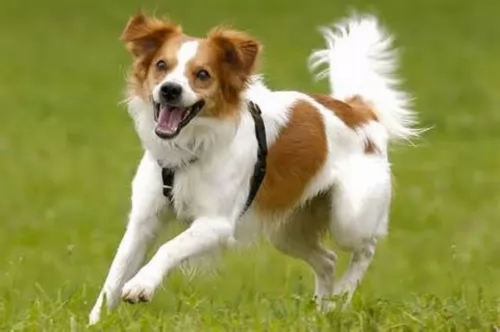 Many troops of World War 1 and World War II would have some or other mascot that they would keep close to them as a reminder of home. The mascot would also inspire them, giving them hope to endure.
Many troops of World War 1 and World War II would have some or other mascot that they would keep close to them as a reminder of home. The mascot would also inspire them, giving them hope to endure.
A Kromfohrlander dog, ‘Original Peter’ was one such mascot – a scruffy Terrier-type dog that army troops from the USA found in France.
This particular dog was accidentally mated with a Fox Terrier, with the breed essentially developing from the military dog from the 1940s. After 10 years of development, the Federation Cynologique Internationale accepted the breed in August, 1955.
It is still a rare breed, being found mainly in Germany.
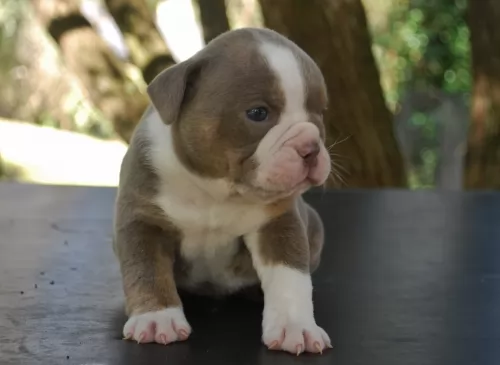 The Hermes Bulldogge, much like the original Olde English Bulldogge, is taller, healthier, more athletic than the original English Bulldog. They are medium height, with a large head, a strong body and a deep, wide chest and broad shoulders. Tails might or might not be docked but the ears are never docked. They n have a moderate amount of wrinkles and a longer, less smashed face than the original. It is easier for the Hermes Bulldogge to breath, to fly and to live in warmer environments that it is for the English Bulldogge. His eyes are lower in his head but in the front center.
The Hermes Bulldogge, much like the original Olde English Bulldogge, is taller, healthier, more athletic than the original English Bulldog. They are medium height, with a large head, a strong body and a deep, wide chest and broad shoulders. Tails might or might not be docked but the ears are never docked. They n have a moderate amount of wrinkles and a longer, less smashed face than the original. It is easier for the Hermes Bulldogge to breath, to fly and to live in warmer environments that it is for the English Bulldogge. His eyes are lower in his head but in the front center.
They are very dark almost black. Eyelids should cover the white of the eye and they have rounded cheeks. They have a short muzzle and short face. Broad, thick lips finish out the face with very large, square, broad jaws.
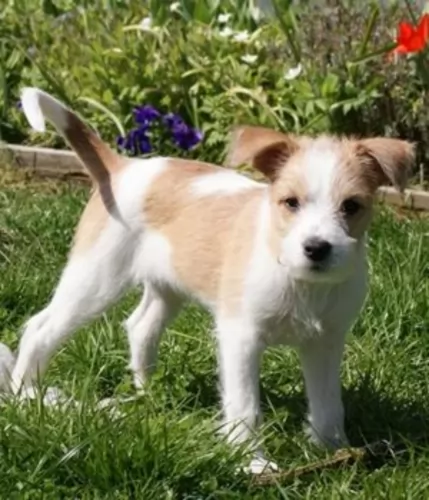 Fondly referred to as the Kromi or the Lander, the purebred Kromfohrlander, known as a companion dog, is medium sized.
Fondly referred to as the Kromi or the Lander, the purebred Kromfohrlander, known as a companion dog, is medium sized.
Both males and females stand at roughly 38 – 46cm in height and they weigh about 9 – 16kg.
They have two different coat types – the smooth haired one and the rough haired one, both coming with a soft undercoat. The dog is a moderate shedder. If you really want to be smart then the smooth coat is referred to as Glatthaar and the wire-haired Rauhaar. The color of the coat is white with brown, orange tan markings with the ears and part of the face mostly covered in the brown/tan markings.
The head of the dog is fairly round shaped and he has half-erect, half floppy ears. His legs are straight and firm and the medium length isn’t docked.
The Kromfohrlander is known for being a loving family pet that loves nothing more than staying within reach of one of his human family members. This closeness with his people means that he can adapt to life in the city or the countryside, so long as he is with his humans.
Wherever he lives though, because he is such an active dog he will require a good dose of mental- and physical stimulation. He is a docile dog, but not timid and not aggressive either, being friendly and amicable by nature. He makes a great playmate for children and is willing to get along with other pets in the home too.
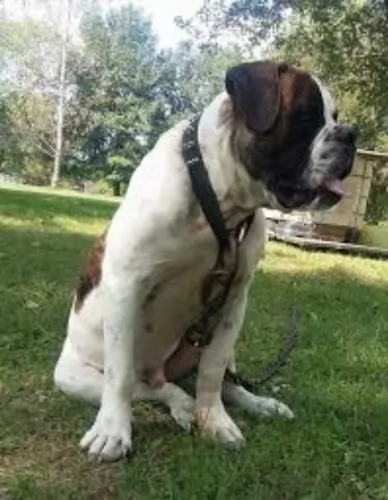 If socialized properly this line of bulldog is harmful to me.
If socialized properly this line of bulldog is harmful to me.
Strong and athletic, his strength and stamina.
He is not very adaptable. Apartments are not good for this dog. He needs to run and if possible to hunt.
He is very intelligent but stubborn which affects his learning ability.
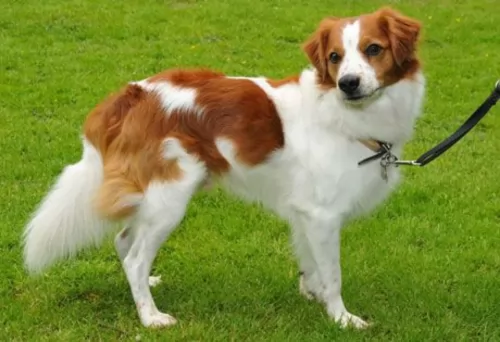 The Kromfohrländer is one of those dogs that has been bred specifically to be man’s best friend.
The Kromfohrländer is one of those dogs that has been bred specifically to be man’s best friend.
When you delve into his history you see that he has never had any particular role as a working- or hunting dog but that he has been bred to be a companion animal.
He can’t be left alone for too many hours as his very nature makes it that he longs to be around his human family constantly. He is therefore not a dependant dog, relying totally on his human family for his sense of well-being.
Low maintenance, easy-going, loving, devoted, lively and social, when you bring the medium-sized Kromfohrlander into your home, it won’t be long before he will have crept into your heart as well.
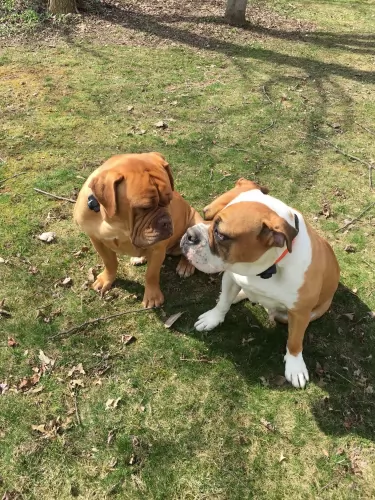 The Hermes Bulldogge is healthier than most bulldogs. His face is not as smashed and he is not as wrinkled. He can breathe easier than other Bulldogs. The two major concerns are hip dysplasia and bloat.
The Hermes Bulldogge is healthier than most bulldogs. His face is not as smashed and he is not as wrinkled. He can breathe easier than other Bulldogs. The two major concerns are hip dysplasia and bloat.
Hip Dysplasia also some elbow dysplasia: can cause lameness and arthritis
Terminal unless treated immediately. Can be prevented by not feeding large meals before or after heavy exercise.
 Feisty, energetic, full of life, entertaining and comical, your Kromfohrlander is intelligent too and with good care, exercise and lots of love your dog will maintain all these good characteristics and reach anything from 12 to 16 years of age.
Feisty, energetic, full of life, entertaining and comical, your Kromfohrlander is intelligent too and with good care, exercise and lots of love your dog will maintain all these good characteristics and reach anything from 12 to 16 years of age.
However, there are some dog illnesses that could affect your dog such as hip dysplasia, ear- and eye infections such as lens luxation which can actually cause loss of vision, cancer, diabetes, epilepsy, bloat and others.
Dogs that are ignored in terms of getting enough exercise are prone to weight gain and this in itself can lead to joint disease and other illnesses.
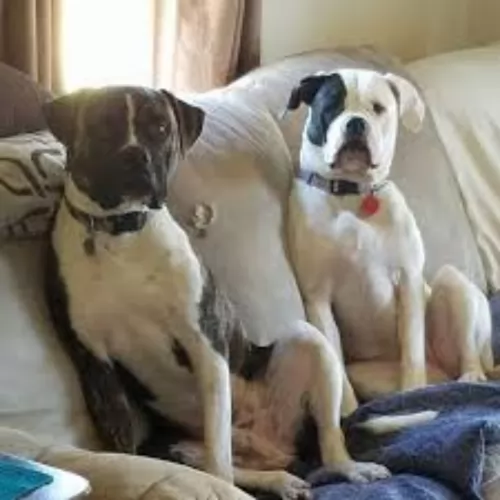 When feeding a Hermes Bulldogge puppy be sure you feed puppy meal for bulldogs or medium dogs. For first year fee 2-4 times a day 2 cups food.
When feeding a Hermes Bulldogge puppy be sure you feed puppy meal for bulldogs or medium dogs. For first year fee 2-4 times a day 2 cups food.
Feed the adult a solid adult dry food. 2 cups twice a day.
Better health than most lines of Bulldogs. Few wrinkles and less problems breathing as he doesn’t have a smashed face.
He doesn’t need a lot of exercise but daily walks and lots of play time. He can enjoy Lure Coursing obedience, agility and obedience
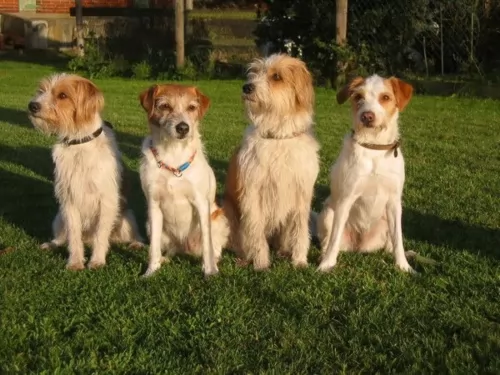 Your Kromfohrlander has two coat types - wirehaired or smooth. Don’t be overwhelmed by the brush and comb selections there are to keep his coat shiny ad healthy.
Your Kromfohrlander has two coat types - wirehaired or smooth. Don’t be overwhelmed by the brush and comb selections there are to keep his coat shiny ad healthy.
The idea is to simply choose a brush such as a bristle brush that can be used on all coat types. A brush like this will allow you to gently brush your pet’s coat to remove grass, dust and burrs and to make it a pleasant experience for your pet.
You want your Kromfohrlander to look forward to his brushing session. You can check him over for lumps, fleas and ticks at the same time.
Other grooming routines that your Kromfohrlander will need is nail clipping, checking inside and outside the ears for fleas and ticks as well as wax- and dirt build-up as well as teeth brushing. If teeth brushing for dogs is new to you there are pet groomers and even your vet who will offer this important service for you.